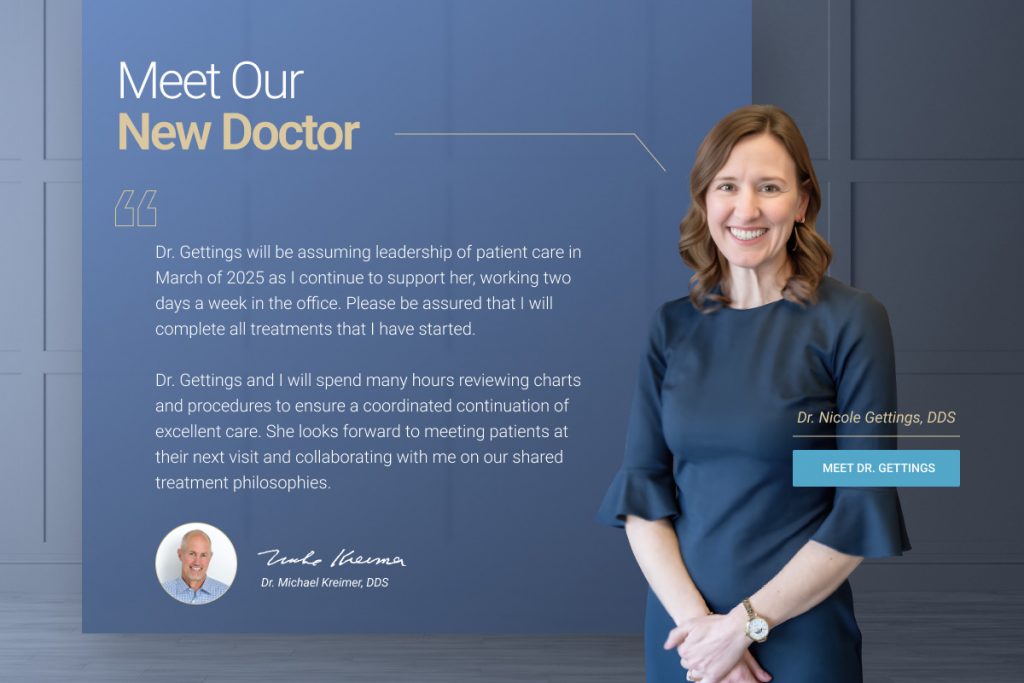Restore Your Smile with Professional Dental Crown Services
A damaged, weak tooth doesn’t have to compromise your confidence or oral health. At Michael Kreimer, DDS, Family and Implant Dentistry in Loveland, OH, we specialize in creating beautiful, durable dental crownsthat restore both function and aesthetics to your smile. Dr. Michael Kreimer and Dr. Nicole Gettings combine over 30 years of experiencewith advanced dental technology to deliver exceptional crown restorations for patients throughout Loveland, Mason, Montgomery, and Lebanon.
Ready to restore your smile? Call (513) 677-3656today to schedule your consultation with our experienced Loveland dental team.

Why Choose Michael Kreimer, DDS, for Restorative Dentistry
Located in the heart of Loveland at 10452 Loveland Madeira Rd, our practice has been serving the greater Cincinnati area for over three decades. Dr. Kreimer’s extensive experience and commitment to continuing education mean you receive the most current techniques and materials available. Dr. Gettings brings fresh perspectives and advanced training from The Ohio State University College of Dentistry, where she graduated magna cum laude. Our practice combines small-town personal attention with big-city expertise, all while maintaining convenient access to Loveland’s charming downtown shops and restaurants just minutes away.
What Are Dental Crowns?
A dental crownis a custom-fabricated cap that completely covers a damaged, weak, or cracked tooth. This tooth-colored restoration acts as a protective shell, restoring the tooth’s original shape, size, strength, and natural appearance while blending seamlessly with your existing teeth. Dental crowns provide a permanent solution for teeth that have been compromised by decay, trauma, or extensive wear.
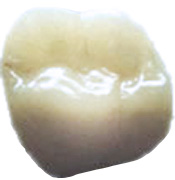
Crown
Types of Dental Crowns
Our Loveland dental practice offers several crown materials to meet your specific needs and preferences:
- Porcelain Crowns: Made entirely from high-grade dental porcelain, these restorations offer superior aesthetics and natural translucency. They resist staining and provide excellent color matching to your natural teeth, making them ideal for front teeth restorations.
- All-Ceramic Crowns: These metal-free restorations combine strength with beautiful aesthetics. They’re biocompatible and perfect for patients with metal sensitivities who want natural-looking results.
- Zirconia Crowns: Crafted from zirconium dioxide, these crowns provide exceptional durability and strength while maintaining a natural tooth color. They’re virtually indestructible and ideal for back teeth that endure heavy chewing forces.
- Porcelain-Fused-to-Metal Crowns (PFM): These restorations feature a metal core for strength with a porcelain outer layer for aesthetics. They offer excellent durability for both front and back teeth applications.
- Same-Day CEREC Crowns: Using advanced CAD/CAM technology, we can design, fabricate, and place your crown in a single appointment, eliminating temporary crowns and multiple visits.
Conditions That Benefit from Dental Crowns
Signs you need a dental crowninclude:
- Severely Decayed Teeth: When cavities are too large for fillings, crowns provide comprehensive protection and restore full functionality to compromised teeth.
- Cracked or Fractured Teeth: Crowns hold damaged teeth together and prevent further splitting or breakage that could lead to tooth loss.
- Root Canal Treatment: After endodontic therapy, teeth become brittle and require crown protection to prevent fracture and restore normal chewing ability.
- Cosmetic Enhancement: Crowns can dramatically improve the appearance of discolored, misshapen, or poorly positioned teeth that don’t respond to other cosmetic treatments.
- Dental ImplantCompletion: Crowns serve as the visible portion of dental implants, completing the restoration and providing natural-looking replacement teeth.
- Large Existing Fillings: When teeth have extensive dental fillingsthat compromise structural integrity, crowns provide superior protection and longevity.
- Stainless Steel Crown Replacement: Many patients choose to replace temporary stainless steel crowns with permanent, natural-looking porcelain or ceramic crowns for improved aesthetics and long-term durability.
- Broken Tooth Restoration: When an existing crown or large filling has cracked or broken, a new crown replacement restores the tooth’s protection and function while maintaining its structural integrity.
Possible situations for a crown
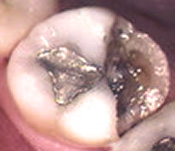
Large tooth decay
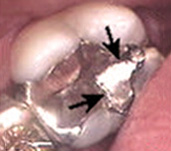
Cracked filling
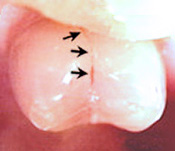
Cracked crown
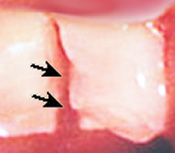
Broken tooth
Benefits of Dental Crown Treatment
Our patients experience numerous advantages of choosing dental crownsat Michael Kreimer, DDS:
- Superior Protection: Crowns completely encircle damaged teeth, providing 360-degree protection against further decay, fracture, or wear while preserving remaining healthy tooth structure.
- Restored Functionality: Crown restorations return full chewing and biting capability to compromised teeth, allowing you to enjoy all your favorite foods without discomfort or limitation.
- Enhanced Aesthetics: Modern crown materials closely mimic natural tooth enamel in color, translucency, and texture, creating beautiful, natural-looking results that boost confidence.
- Long-Term Durability: With proper care and maintenance, quality dental crowns can last 10-15 years or longer, providing excellent value and avoiding repeated treatments.
- Improved Oral Health: Crowns seal off damaged areas from bacterial invasion, preventing further decay and potential tooth loss while supporting overall oral health.
- Versatile Applications: From single tooth restoration to complex smile makeovers, crowns adapt to various treatment plans and patient needs with predictable success.
- Conservative Treatment: Crowns preserve natural tooth structure while providing comprehensive restoration, avoiding more invasive procedures like extractions and implants when possible.
The Dental Crown Process at Our Loveland Dentist’s
Our streamlined dental crown procedure prioritizes your comfort and convenience while delivering exceptional results:
- Comprehensive Consultation: Dr. Kreimer or Dr. Gettings examines your teeth using digital X-rays and intraoral photography to assess damage and determine if crowns are the optimal treatment solution.
- Treatment Planning: We discuss crown material options, expected outcomes, and timeline while addressing any questions or concerns you may have about the procedure.
- Tooth Preparation: Under local anesthesia for maximum comfort, we carefully reshape the affected tooth by removing damaged areas and a small amount of healthy enamel to accommodate the crown.
- Precision Impressions: We capture detailed digital or physical impressions of your prepared tooth and surrounding teeth to fabricate a perfectly fitting custom crown.
- Temporary Crown Placement: A provisional crown protects your prepared tooth while your permanent restoration is crafted in our trusted dental laboratory over one to two weeks.
- Final Crown Placement: At your second appointment, we remove the temporary crown, verify the fit and aesthetics of your permanent crown, and securely cement it in place.
- Bite Adjustment: We carefully check your bite and make any necessary adjustments to maintain comfortable chewing and proper jaw alignment.
- Post-Treatment Care: Our team provides detailed instructions for crown care and schedules your follow-up appointment to monitor healing and satisfaction.
Don’t let damaged teeth hold you back from smiling with confidence. Contact our Loveland dentist’s office at (513) 677-3656 to discover how dental crowns can transform your oral health and appearance.
Caring for Your Dental Crowns
Proper maintenance of your tooth restorationextends the life of your crown investment and protects your oral health:
- Daily Hygiene: Brush twice daily with fluoride toothpaste and a soft-bristled toothbrush, paying special attention to the gum line where the crown meets your natural tooth.
- Regular Flossing: Daily flossing removes plaque and bacteria from between teeth and around crown margins, preventing decay and gum disease.
- Dietary Considerations: Avoid chewing ice, hard candies, or using teeth as tools to prevent crown damage or dislodgement.
- Professional Cleanings: Maintain regular six-month dental checkups and teeth cleaningsto monitor crown condition and overall oral health.
- Night Guard Protection: If you grind or clench your teeth, wear a custom night guard to protect crowns from excessive forces during sleep.
Dental Crown Costs Near Cincinnati
Crown costs vary based on material choice, complexity, and individual treatment needs, typically ranging from $800-$2,500per crown. Many dental insurance plans cover 50-80% of crown costs when medically necessary. We accept most insurance plans and offer flexible payment options through CareCreditfinancing. Our team provides detailed cost estimates during your consultation.
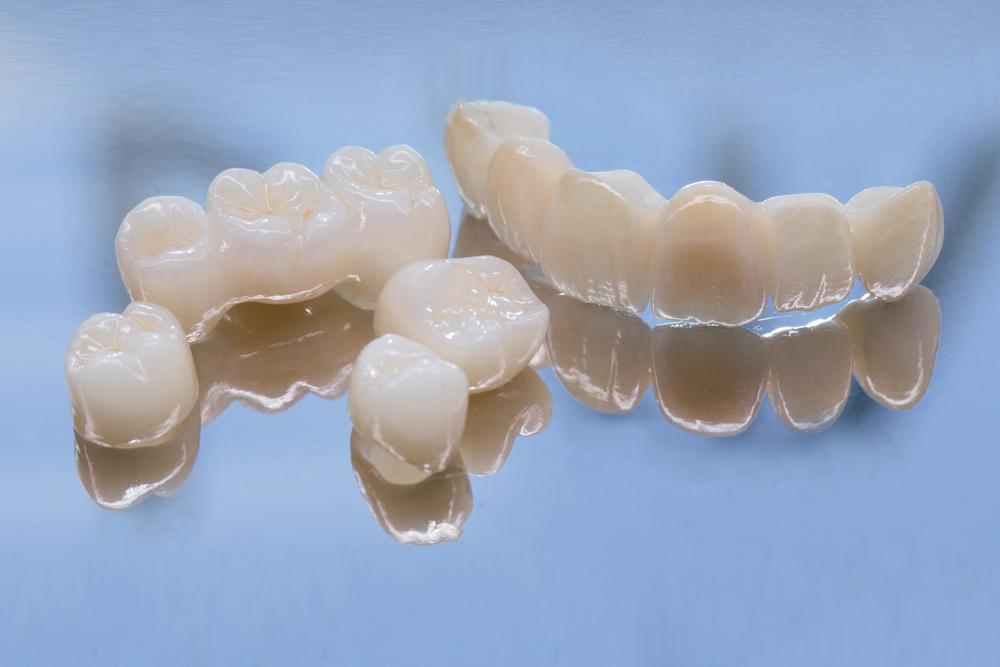
Frequently Asked Questions
How long do dental crowns last?
Dental crowns typically last 10-15 years with proper care and maintenance. Factors affecting longevity include crown material, oral hygiene habits, dietary choices, and teeth grinding. Regular dental checkups help monitor crown condition and identify potential issues early. Some patients enjoy their crowns for 20+ years with excellent care.
Are dental crowns painful to get?
The crown procedure itself is not painful thanks to local anesthesia that completely numbs the treatment area. Some patients experience mild sensitivity or discomfort after anesthesia wears off, which typically resolves within a few days. Over-the-counter pain medications effectively manage any post-treatment discomfort. Most patients return to normal activities immediately after treatment.
Can dental crowns be whitened?
Dental crowns cannot be whitened with traditional bleaching treatments because crown materials don’t respond to whitening agents like natural teeth. However, professional cleaning can remove surface stains and restore the crown’s original appearance. If significant discoloration occurs, crown replacement may be necessary to match your desired shade.
Will my dental crown look natural?
Modern dental crowns are virtually indistinguishable from natural teeth when properly crafted and placed. We carefully match crown color, shape, and size to your existing teeth using advanced shade guides and digital technology. Our laboratory technicians are skilled artisans who create crowns with natural translucency and surface texture.
Can I eat normally with dental crowns?
Yes, dental crowns restore full chewing function, allowing you to enjoy all your favorite foods comfortably. We recommend avoiding extremely hard or sticky foods immediately after placement to allow proper healing. Once fully integrated, crowns function exactly like natural teeth with no dietary restrictions. Proper care maintains crown integrity for years of comfortable eating.
Schedule Your Dental Crown Consultation in Loveland Today
Experience the difference that quality dental crowns can make in your life. Our experienced Loveland team is ready to help you achieve optimal oral health and a beautiful smile. Call (513) 677-3656today to schedule your comprehensive crown consultation.
At Michael Kreimer, DDS, we’re committed to providing exceptional dental crown services to patients throughout Loveland, Mason, Montgomery, Lebanon, and the greater Cincinnati area. Our combination of advanced technology, premium materials, and personalized care creates crown restorations that exceed expectations for both function and beauty. Don’t let damaged or unsightly teeth compromise your quality of life – contact our Loveland dental office near youtoday to discover how dental crowns can restore your smile’s health, function, and natural beauty.


